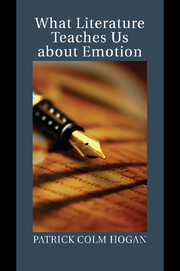Book contents
- Frontmatter
- Contents
- List of Figures
- Acknowledgments
- Introduction: Studying Literature Studying Emotion
- 1 Fictions and Feelings
- 2 What Emotions Are
- 3 Romantic Love
- 4 Grief
- 5 Mirth
- 6 Guilt, Shame, Jealousy
- 7 From Attachment to Ethical Feeling
- 8 Compassion and Pity
- Afterword: Studying Literature Shaping Emotion
- Works Cited
- Index
- Title in the series
6 - Guilt, Shame, Jealousy
Macbeth, The Strong Breed, Kagekiyo, and Othello
Published online by Cambridge University Press: 03 May 2011
- Frontmatter
- Contents
- List of Figures
- Acknowledgments
- Introduction: Studying Literature Studying Emotion
- 1 Fictions and Feelings
- 2 What Emotions Are
- 3 Romantic Love
- 4 Grief
- 5 Mirth
- 6 Guilt, Shame, Jealousy
- 7 From Attachment to Ethical Feeling
- 8 Compassion and Pity
- Afterword: Studying Literature Shaping Emotion
- Works Cited
- Index
- Title in the series
Summary
Macbeth and Emotions of Self-Blame
Feelings may be connected with any aspect of a literary work – most obviously events and characters, but also scenes or language. Often, a scene will prime associations that prepare the reader or audience for the event- and character-focused emotions that follow. For example, the dark, abandoned alley in a horror film may prepare us to fear for the heroine as she walks home late at night. The opening scene of Macbeth has such an emotionally orienting function. Specifically, it begins to establish the background for the emotions of self-blame – guilt, shame, and regret – that will pervade the rest of the play. By definition, all such emotions refer to some prior act or event that is, in retrospect, aversive. In each case, one feels some sort of emotional pain insofar as one connects oneself causally with that act or event. The following pages consider what properties differentiate these emotions and what the consequences of those properties might be.
The opening of the play is forbidding. First, there is the thunder and lightning – triggers for fright. Moreover, unnatural figures such as the witches are likely to provoke at least anxiety, if not actual fear. More importantly, the scene – including the physical appearance of the witches – prepares us for disgust. What we in the audience see from the first moment must be consistent with their unpalatable androgyny, as later explained by Banquo – “You should be women,/And yet your beards forbid me to interpret/That you are so” (I.iii.45–47).
- Type
- Chapter
- Information
- What Literature Teaches Us about Emotion , pp. 175 - 220Publisher: Cambridge University PressPrint publication year: 2011



